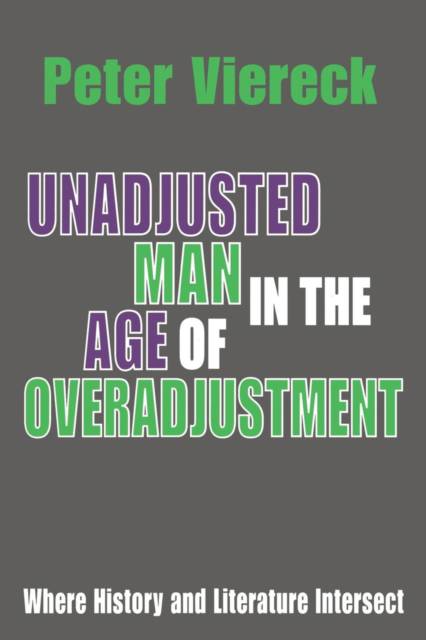
- Retrait gratuit dans votre magasin Club
- 7.000.000 titres dans notre catalogue
- Payer en toute sécurité
- Toujours un magasin près de chez vous
- Retrait gratuit dans votre magasin Club
- 7.000.0000 titres dans notre catalogue
- Payer en toute sécurité
- Toujours un magasin près de chez vous
Unadjusted Man in the Age of Overadjustment
Where History and Literature Intersect
Peter Viereck
Livre broché | Anglais
61,45 €
+ 122 points
Format
Description
The great critic Peter Viereck, in a volume that both reproduces an earlier effort and presents an entirely new work on the intersection of history and literature, offers a biting critique of the American desire for normalcy that leads to a culture of the surrender of personality. In contrast to this voluntary thought control process is the unadjusted person. Cast in the mold of great individualists from Thomas More to Friedrich Nietzsche, such a person responds to fundamental values of conscience rather than conformity built exclusively on ego gratification and icon worship.Viereck's book is a stinging critique of the liberal presumption of a monopoly in critical thought. He argues to the contrary, that most varieties of liberal expression offer little else than the common platitude dressed up as critique. In such a cultural environment, conservatism is the skeleton in the liberal closet. The virtue of conservatism is that in its very stress on liberty as dependent on tradition and law, it permits the human being an opportunity to test all transient things by the touchstone of all lasting ideas. Unadjusted Man cuts deep and in many directions: against left totalitarian regimes of Europe and right wannabes like McCarthyism in America. For Viereck, the art of conserving is not an embrace of utopias to come or empires that were, but retaining the sense of individuality over against the senselessness of the "massman." Civil liberties in this approach are a right to non-conspiratorial dissent informed by fundamental values.The new material is presented unabashedly--without an attempt to rewrite personal history, and with an admission that not every prediction made in the original edition has come to fruition. That said, the underlying themes of the original are not so much repeated as expanded upon. For those seeking a work in the classic mold of conservatism, rather than the strident reactionary views that have come to dominate much of the conservative dialogue, this will be a special book, a special entrance to the mind of a great figure in American culture wars of present as well as past.
Spécifications
Parties prenantes
- Auteur(s) :
- Editeur:
Contenu
- Nombre de pages :
- 400
- Langue:
- Anglais
Caractéristiques
- EAN:
- 9780765808066
- Date de parution :
- 31-10-03
- Format:
- Livre broché
- Format numérique:
- Trade paperback (VS)
- Dimensions :
- 159 mm x 227 mm
- Poids :
- 598 g

Les avis
Nous publions uniquement les avis qui respectent les conditions requises. Consultez nos conditions pour les avis.






